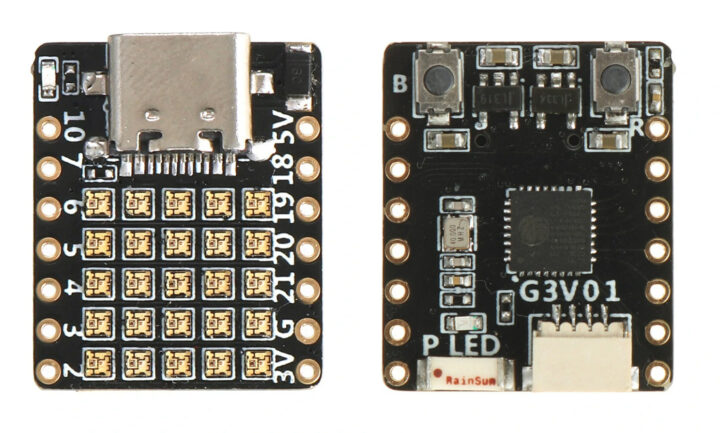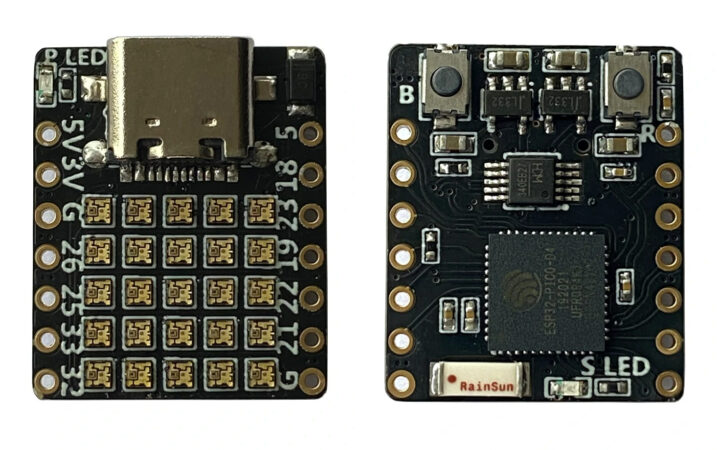In case you are in need of a tiny WiFI or Bluetooth-connected board with an RGB LED matrix, two have shown up on Banggood with basically the same 25 RGB LED design , except “C3FH4 RGB” board is based on ESP32-C3 RISC-V SoC, while the other, named “PICO D4 RGB“, features ESP32-Pico-D4 SiP (System-in-Package).
The boards are cute and the main purpose is probably for decoration/ornament, but I’d imagine if you purchase a few they could also be used as an experimentation/education platform for mesh networking, using the ESP Mesh Development Framework (ESP-MDF) for instance.

C3FH4 RGB / PICO D4 RGB board specifications:
- SoC/SiP
- C3FH4 RGB board – ESP32-C3FH4 SoC with RISC-V core @ 160 MHz, 4MB flash, 2.4GHz Wi-Fi, and Bluetooth 5 LE with Long-Range support
- PICO D4 RGB board – ESP32-PICO-D4 system-in-package with ESP32 dual-core Xtensa processor @ 240 MHz, 2.4GHz Wi-Fi and Bluetooth dual-mode, 4MB flash
- Ceramic antenna
- “Display” – 25x WS2812B-1515 RGB LEDs arranged in a 5×5 matrix
- USB – 1x USB Type-C port for power and programming via CH340E USB to TTL chip
- Expansion – 2x 7-pin headers with up to 11x GPIOs, 5V, 3.3V, GND
- Misc
- Enable and user buttons, power LED, and status/user LED
- C3FH4 RGB board only – Additional 4-pin header (not sure what it is for yet, power or expansion?)
- Dimensions – 21 x 18 mm
- Weight – About 2 grams

01Space provides Arduino code samples for both boards under separate Github repositories. Both repos have exactly the same samples “BlinkWithoutDelay”, “RGBWstrandtest”, and “strandtest_wheel”. It appears they only separated the repo because each board uses different GPIOs for the RGB LEDs (GPIO2 vs GPIO8), user button and LED. It makes me sad as they could have just defined a constant to compile for either platform instead.
I estimated I would need about 240 boards to decorate a door frame if I were to reserve 2cm for each board. That would be fun, but certainly not the most cost-effective way to decorate my door with some pretty lights :).
The ESP32-C3 board is the cheapest of the two as it is offered for $10.99 shipped on Banggood, while the ESP32-PICO-D4 version goes for $15.99 including shipping.

Jean-Luc started CNX Software in 2010 as a part-time endeavor, before quitting his job as a software engineering manager, and starting to write daily news, and reviews full time later in 2011.
Support CNX Software! Donate via cryptocurrencies, become a Patron on Patreon, or purchase goods on Amazon or Aliexpress





For those interested in that feature set there’s also M5Stack’s ATOM https://shop.m5stack.com/collections/atom-series/products/atom-matrix-esp32-development-kit which also has an ESP32 and a 5×5 LES matrix, but comes in a case, and includes a button, an accelerometer, a Grove-type connector and another set of connectors on the bottom for expansion.
I wrote about M5Stack Atom Matrix about two years ago, but completely forgot about it…
https://www.cnx-software.com/2020/03/26/m5stack-atom-is-a-compact-fully-integrated-esp32-development-kit/#m5stack-atom-matrix
Oh you’re right , nice device !
I like this tiny device too, a little expensive compared to the m5stack but very compact.
May be the led matrix is too small to be readable ? I mean if you draw an arrow, can you see it at 3 meters ?
Reminds me of the BBC Doctor Who “HiFive Inventor” Coding Kit but that one had a whopping 8×6 LEDs.
Probably a bit small for that. One difference between the one in the article and the M5 Atom matrix is the spacing between the LEDs, not sure how that would affect readability. If you wan something larger (but still 5×5) you have the BBC micro:bit https://microbit.org/get-started/user-guide/overview/ That one is based on the nrf52833 but has quite a few more gadgets.
Totally useless but very fun. I’ll order one 🙂
That connector seems like something similar to grove, as the silkscreen reads G3V01, I guess meaning the 4 pins carry: GND, 3V, I/O 0, I/O 1
Would be interesting what the alternate functions of the connected GPIOs are…
I’ve done some work with MicroPython on these boards, in case readers are interested (and I’ve linked to this story in my research notes in the GitHub repo)
https://dev.to/andypiper/bringing-the-bling-with-micropython-hn1